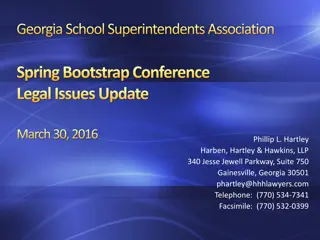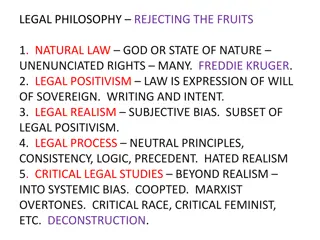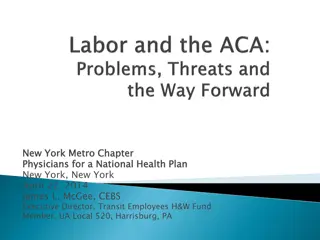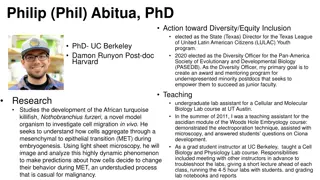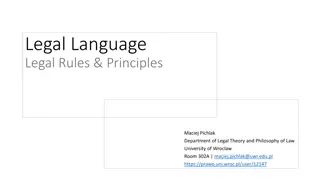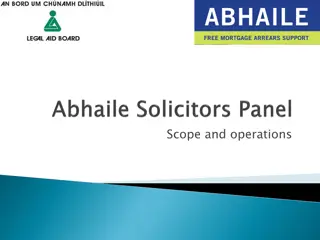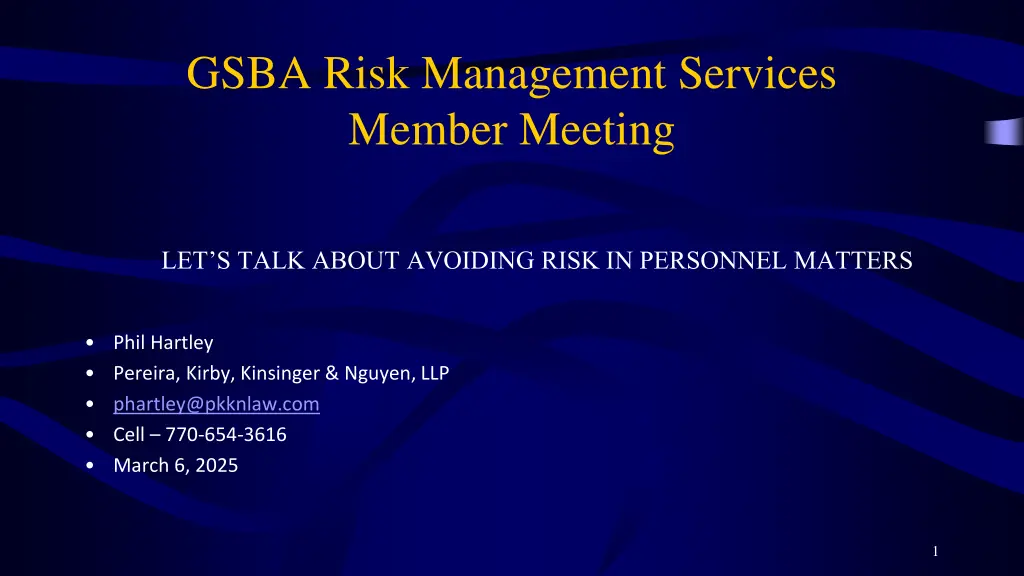
Avoiding Risk in Personnel Matters
Learn about the legal provisions and requirements for hiring personnel in the education sector. Understand the rules regarding board and superintendent concurrence, conflicts of interest, immediate family definitions, and nepotism to prevent risks in personnel matters.
Download Presentation

Please find below an Image/Link to download the presentation.
The content on the website is provided AS IS for your information and personal use only. It may not be sold, licensed, or shared on other websites without obtaining consent from the author. If you encounter any issues during the download, it is possible that the publisher has removed the file from their server.
You are allowed to download the files provided on this website for personal or commercial use, subject to the condition that they are used lawfully. All files are the property of their respective owners.
The content on the website is provided AS IS for your information and personal use only. It may not be sold, licensed, or shared on other websites without obtaining consent from the author.
E N D
Presentation Transcript
GSBA Risk Management Services Member Meeting LET S TALK ABOUT AVOIDING RISK IN PERSONNEL MATTERS Phil Hartley Pereira, Kirby, Kinsinger & Nguyen, LLP phartley@pkknlaw.com Cell 770-654-3616 March 6, 2025 1
Hiring Personnel: What Does the Law Provide? All teachers, principals, other certificated professional personnel, and other personnel of a local unit of administration shall be employed and assigned by its governing board on the recommendation of its executive officer. O.C.G.A. 20-2-211(a) 2
Hiring Personnel Requires Board and Superintendent Concurrence No person may become an employee of the district without board approval; The board may not hire any person without the recommendation of the superintendent. 3
Conflict of Interest in Hiring Employees No local board of education shall employ or promote any person who is a member of the immediate family of any board member unless a public, recorded vote is taken on such employment or promotion as a separate matter from any other personnel matter. Any board member whose immediate family member is being considered for employment shall not vote on such employment. O.C.G.A. 20-2-58.1 4
Who Is the Immediate Family of a Board Member? As used in this Code section, the term "immediate family" means a spouse, child, sibling, or parent, or the spouse of a child, sibling, or parent. O.C.G.A. 20-2-58.1 5
Nepotism No person who has an immediate family member sitting on a LBOE or serving as the local school superintendent, or as a principal, assistant principal, or system administrative staff in the local school system shall be eligible to serve as a member of such LBOE Immediate Family Member spouse, child, sibling, or parent or spouse of a child, sibling or parent whose employment as the local school superintendent or as a principal, assistant principal, or system administrative staff in the local school system began on or after January 1, 2010 6
Nepotism Provisions for Superintendency No person shall be eligible to be appointed, employed, or to serve as superintendent of schools of any county or independent school system who has an immediate family member sitting on the local board of education for such school system or who has an immediate family member hired as or promoted to a principal, assistant principal, or system administrative staff on or after July 1, 2009, by that school system. Immediate family member definition includes 1/1/10 limitation 7
Terminating Employees and the Fair Dismissal Act of Georgia Know the Difference: At will employees, employees under contract and employees with tenure; How are at will employees terminated? 8
Terminating Employees Under Contract What reasons does the law provide for terminating employees under contract? Incompetency, Insubordination, Willful neglect of duties; Immorality, Encouraging students to violate rules or laws, Reduction in force, Failure to maintain educational training; and Other good and sufficient cause. Requires a hearing O.C.G.A. 20-2-940 9
Which Employees Have Tenure? What is tenure? What is transfer tenure? Do administrators have tenure? A person who first becomes a school administrator on or after April 7, 1995, shall not acquire any [tenure]rights... with respect to any position of school administrator. O.C.G.A. 20-2-942 10
Procedures for Non-Renewing Tenured Employees May 15th notice; Right to request a hearing; Thereafter, process essentially the same as terminating teacher under contract 11
Day v. Floyd County BOE, Ga. Court of Appeals Because [the] FDA is among the provisions of Title 20 generally waived, a charter system is not subject to the FDA unless the system s charter so provides or unless an exception to the general waiver contained within Title 20 applies. This is the plain and unambiguous import of the statute. Having accepted employment with a charter system that was not subject to the FDA, Day had no tenure or right to continued employment with that charter system; consequently, she was not entitled to any of the procedural rights afforded to tenured employees under the FDA prior to the nonrenewal of her employment contract.
Woods v. Barnes (Ga. S.Ct. 2/20/24) [W]hen the General Assembly first authorized the creation of public charter schools through the Charter Schools Act of 1993, it granted charter schools a waiver from their obligation to comply with Title 20. That waiver qualified any rights teachers could subsequently earn under Title 20, clarifying that any such rights were not enforceable against charter schools. And later versions of, and amendments to, the Charter Schools Act, including the Charter Schools Act of 1998, as amended by the Charter Systems Act of 2007, have not materially changed the waiver provision. [I]t was the 1993 Charter Schools Act that imposed those limitations, not, as Plaintiffs claim, the 2007 Charter Systems Act. Because we conclude that Plaintiffs Impairment Clause claims fail as a matter of law, we reverse the judgment of the trial court.
Woods v. Barnes (Ga. S.Ct. 2/20/24) What Does It Mean? Charter Systems have waived the FDA at least as of 1993 Strategic Waiver Systems must review as of date that FDA was included as a code section waived in the SWS Exhibit B, still a question as to those earning tenure before that date and staying with the same school district or is it as of the date that FDA could be waived, which would be same as charter Figure out the tenure options if you are a SSW system now, before you need to argue it
Other Fair Dismissal Act Issues Suspension Demotion Reprimand 15
Terminating Employees and Federal Law All school district employees protected by Title VII, ADEA, ADA prohibiting discrimination based on race, color, national origin, sex, religion, disability or age; Employees also have certain first and fourteenth amendment rights while employed by a school district. Also other federal and state laws that prohibit retaliation for whistleblowing and exercising other rights 16
Muldrow v.City of St. Louis, 601 U.S. 346 (April 17, 2024) 2008- 2017Sergeant Muldrow worked as a plainclothes officer in the Intelligence Division. Also deputizedasaTask ForceOfficer withthe Federal BureauofInvestigation, whichprovidedFBI credentials, an unmarked take home vehicle, and the authoritytopursueinvestigations outsideSt.Louis. 2017New Intelligence Division commander, called Muldrow Mrs. askedtheDept.totransfer Muldrow in exchangefora male police officer, whomhe testified was abetter fitfortheDivision s very dangerous work. The Department approved the transfer againstMuldrow swishes andreassigned her to auniformedjob. Rank and pay:same. But less responsibility, fewer perks, scheduleless desirable, uniformed,noFBIcar orstatus, less predictable schedule, less prestige.
Muldrow v.City of St. Louis, 601 U.S. 346 (April 17, 2024) Muldrowsued underTitle VIIchallenging the transfer asdiscrimination based onsex withrespect to the terms [or] conditions ofher employment. The District Courtgranted the Citysummary judgmentand8thCir. affirmed. Itagreedthat Muldrow had to but couldnot showthat the transfer caused a materially significant disadvantage. Thetransfer didnotresult in a diminutionto her title, salary, orbenefits and the changein her jobresponsibilities was insufficient to supporta Title VII claim. Overall, the courtheld, Muldrow sclaim couldnotproceedbecauseshe had experienced onlyminorchangesin working conditions.
Muldrow v.City of St. Louis, 601 U.S. 346 (April 17, 2024) SCOTUSgrantedcert.toresolve aCircuitsplit over whetheranemployeechallengingatransfer under Title VIImust meet a heightened thresholdof harm significant, serious. Title VIIimposes nosuch requirement 9-0ruling written byJustice Kagan,with 3 concurrences, based onTitle VII stext: Itis unlawful foran employer to fail orrefuse to hire or to discharge anyindividual, or otherwise to discriminate againstanyindividual withrespect tohis compensation, terms, conditions,orprivileges of employment,becauseofsuch individual srace, color, religion,sex, ornational origin.
Muldrow v.City of St. Louis, 601 U.S. 346 (April 17, 2024) Muldrow ssuit alleges that she was transferred toa lesser position becauseshe is a woman.That transfer, as bothparties agree, implicated terms and conditions ofMuldrow semployment, changingnothingless than the what, where, and when of her police work. discriminate against, = differences in treatment that injure employees. Tomakeouta Title VIIdiscrimination claim, a transferee must showsomeharmrespecting anidentifiable term or conditionofemployment.Whatthe transferee does not havetoshow,accordingtotherelevant text, is that the harmincurredwas significant.
Muldrow v. City of St. Louis, 601 U.S. 346 (April 17, 2024) 3 concurrences: Justice Thomas: The majority misinterprets the 8thCircuit sopinion. It applied a standard requiring a tangiblechange in workingconditionsthatproducesa material employment disadvantage, which is not a heightened-harm requirement. Justice Alito: The majority fails to clarify the degree of harm required under Title VII. There is little if any substantive difference between the terminologythe Court approves and the terminology it doesn t like. JusticeKavanaugh: The majority properly rejectsthe significantemployment disadvantage requirement, but its new some harm standard is not helpful. This scenario clearlyviolates Title VII but may not satisfy the majority s some harm requirement: Weare transferringyou to the Cincinnatioffice because you are black. But your compensation will not change. Any transfer on a discriminatory basis no matter how quantifiable the harm should be a violation of Title VII.
Executive Orders Ending Radical And Wasteful Government DEI Programs And Preferencing - January 20, 2025 The Director of the Office of Management and Budget (OMB), assisted by the Attorney General and the Director of the Office of Personnel Management (OPM), shall coordinate the termination of all discriminatory programs, including illegal DEI and diversity, equity, inclusion, and accessibility (DEIA) mandates, policies, programs, preferences, and activities in the Federal Government, under whatever name they appear. To carry out this directive, the Director of OPM, with the assistance of the Attorney General as requested, shall review and revise, as appropriate, all existing Federal employment practices, union contracts, and training policies or programs to comply with this order. Federal employment practices, including Federal employee performance reviews, shall reward individual initiative, skills, performance, and hard work and shall not under any circumstances consider DEI or DEIA factors, goals, policies, mandates, or requirements.
In recent years, American educational institutions have discriminated against students on the basis of race, including white and Asian students, many of whom come from disadvantaged backgrounds and low-income families. These institutions embrace of pervasive and repugnant race-based preferences and other forms of racial discrimination have emanated throughout every facet of academia. For example, colleges, universities, and K-12 schools have routinely used race as a factor in admissions, financial aid, hiring, training, and other institutional programming. In a shameful echo of a darker period in this country s history, many American schools and universities even encourage segregation by race at graduation ceremonies and in dormitories and other facilities
Educational institutions have toxically indoctrinated students with the false premise that the United States is built upon systemic and structural racism and advanced discriminatory policies and practices. Proponents of these discriminatory practices have attempted to further justify them particularly during the last four years under the banner of diversity, equity, and inclusion ( DEI ), smuggling racial stereotypes and explicit race- consciousness into everyday training, programming, and discipline.
NatlAssn of Diversity Officers in Higher Educ., et al., v. Donald J. Trump, et al., No. 1:25-cv-00333-ABA, Dkt. 44-45 (D. Md. 2025). The Court found that the Plaintiffs proved that failure to enjoin the conduct [continuing DEI or DEIA would cause irreparable harm in four ways: threat of loss of funds, uncertainty regarding future operations, loss of reputation, and chilled speech. The Court found that the balance of the equities and the public interest also merited entering the injunction, as the Plaintiffs had shown that the Challenged Provisions infringe[d] on core constitutional protections, and that the status quo must be maintained while Plaintiffs and the government litigate the claims asserted in the case.
BELIEVE IN PUBLIC EDUCATION
Questions? 27







